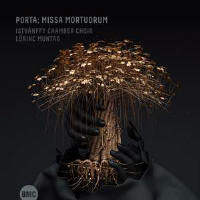Texte paru dans: / Appeared in:
BMC |
|
|
Outil de traduction ~ (Très approximatif) |
|
|
Reviewer: J.
F. Weber
The director and several members of this choir grew up as children singing in Schola Hungarica, which was not only a prolific contributor to the Hungaroton, Budapest Music, and other record catalogs but a training ground for choral singers. In the booklet notes Zoltán Mizsei, director of St. Stephen’s Basilica choir in Budapest, shares what it meant to him to grow up with the same training. His basilica in the heart of Pest is now a cathedral. Budapest was not a diocese until 1993, for the city was divided among four dioceses. That year, the primatial see of Esztergom became Esztergom-Budapest, and St. Stephen’s became the co-cathedral. Now this chamber choir has made its first recording, combining the polyphony of Costanzo Porta (1528/29–1601) with Gregorian chant from the same Hungarian manuscripts that Schola Hungarica used. Porta was an exact contemporary of Palestrina, but he directed choirs in Osimo, Ravenna, Loreto, and Padua. He had studied with Willaert in Venice, where he met his fellow student Claudio Merulo, who remained a close friend. This Mass, which dates from about 1575, was recorded two decades ago but not submitted for review, one of three Masses that were recorded around the quatercentenary of the composer’s death. All the Ordinary and Proper parts of the Requiem are included, adding the chant gradual Si ambulem and tract Sicut cervus that were found in 16th-century Masses for the Dead. The disc opens with a chant responsory Si bona suscepimus that was recorded by Schola Hungarica and closes with a motet by Porta for seven voices. The alternatim Dies irae sets alternate verses in chant and polyphony. The choir, founded in 2014, sings with superb tone but without the rushed tempos in the chant that I found unappealing in Schola Hungarica’s recordings. This is a remarkably fine debut disc. I hope that Muntag, who recorded this disc in 2018 after concert performances, will pursue other neglected areas of Renaissance polyphony, for he has started something good here.
| |
|
|
|
|
Cliquez l'un ou l'autre
bouton pour découvrir bien d'autres critiques de CD |
|




